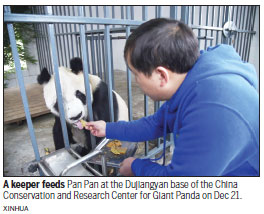World's oldest 'panda grandpa'dies in China

Pan Pan, the world's oldest male giant panda and genetically linked to several pandas at the Smithsonian's National Zoo in Washington, died on Wednesday morning in Southwest China's Sichuan province.
Pan Pan, which passed at 4:50 am, was 31. An autopsy is being carried out to find the cause of his death, though the circumstances are not thought to be suspicious.
"Pan Pan was the equivalent to about 100 human years, but he had been living with cancer and his health had deteriorated in the past three days," Tan Chengbin, a keeper with the Dujiangyan base of the China Conservation and Research Center for Giant Panda, told Xinhua. "He had lost consciousness."
An article on Washingtonian website described Pan Pan as linked to about a quarter of the world's population of captive-born pandas, including Tian Tian and the three cubs raised at the National Zoo in Washington since 2005.
Though born in the wild in Sichuan's Baoxing county in 1985, Pan Pan lived in captivity from just a few months old.
"Panda grandpa," as he became known, was diagnosed with cancer in June this year, and also suffered from common old-age conditions, such as cataracts and poor teeth.
A Xinhua reporter who last saw him on Dec 21 said he was in a "nursing home" for elderly pandas, and though he was very thin he was keeping in good spirits.
"When the keeper called his name and offered him food, usually steamed corn bread or fresh bamboo leaves, he was able to respond and move out to have dinner," the reporter said.
Pandas are notoriously difficult to breed, but Pan Pan lived a particularly active life for a panda and fathered many cubs over the past 20 years. He has more than 130 descendants, accounting for 25 percent of the world's captively bred panda population.
In 2012, as the National Zoo was in the seventh year of a panda-cub drought, one of its research scientists told the Washington Post that Pan Pan was a "really good natural breeder," according to the Washingtonian report on Wednesday.
It described Tian Tian as famously dismissed as a "clueless breeder with flawed technique." His three offspring with Mei Xiang were all produced through artificial insemination.
The average lifespan of wild pandas is normally 20 years, but those in captivity usually live longer.
Pan Pan, which means "expectation" in Chinese, was also name of the mascot for the 1990 Beijing Asian Games, though the mascot was not modeled on "panda grandpa" but on a 36-year-old female panda Basi, currently the oldest panda in the world.
Giant panda's status has improved from endangered to vulnerable this year. Fewer than 2,000 pandas live in the wild, mostly in the provinces of Sichuan and Shaanxi. At the end of 2013 China had 1,864 giant pandas in the wild. There are also 422 in captivity, China's State Forestry Administration said.
Pan Pan is survived by numerous descendants.

(China Daily USA 12/29/2016 page1)
Today's Top News
- Sanae Takaichi set to be reelected Japanese PM
- Xi sends Chinese New Year card in return to friends in US state of Iowa
- Japanese PM Takaichi's cabinet resigns
- Iran not to abandon peaceful nuclear technology
- 2nd round of Iran-US talks held in 'constructive' atmosphere, new talks to be scheduled: Iran's FM
- The Year of the Horse: A new gallop for the Spring Festival Gala






























